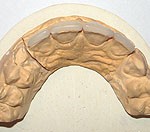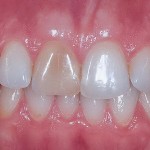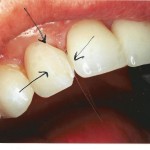Dental veneers are a thin coating of ceramic that is placed over the tooth on the outer side of the tooth. The placement of veneers on your teeth will give you a brighter smile and improve the appearance of your teeth. The cosmetic treatment consists of thin, customized, tooth-colored shells that qualified dentists bond to the outer surface of teeth. Dental veneers can correct problems related to the color, length, size and shape of teeth when properly constructed and attached.
Because of their numerous benefits, veneers are considered today a first-class cosmetic dentistry solution. However, any dental treatment has its potential risks and side-effects. Make sure you find an experienced dentist who can determine your candidacy for cosmetic veneers. If you qualify as a candidate, you still have to be sure the benefits of cosmetic veneers outweigh the risks, before you decide to go with the treatment. Let’s take a look at some of the risks associated with porcelain veneers. This will help prospective patients to better understand how this treatment works.
Colour irregularities
The final color of a dental veneer depends on various factors, according to the May 2006 article “Facing the Challenges of Ceramic Veneers” in “The Journal of the American Dental Association.” The shade of the veneer, the color of the underlying tooth and the color of the bonding substance all determine what the dental veneer will look like once the dentist attaches it. If your dentist does not give those three contributing factors adequate consideration, placed veneers may not match the color of surrounding teeth.
Some dental veneers may develop discoloration underneath or stains along the edges due to issues like the presence of moisture when the dentist seals the veneers. Unfortunately, the Cleveland Clinic reports that dentists cannot alter or correct the color of dental veneers after they attach them. However, the original color of dental veneers usually remains consistent for their estimated 5 to 10-year life.
Risk of trauma to the teeth
Sometimes increased risk of trauma to the teeth can occur following the procedure. During the procedure to place dental veneers on your teeth, some of your tooth enamel will be removed to allow the veneer to attach. This causes the teeth to be more sensitive to hot and cold after the procedure. Although this symptom is usually slight, it also can be discomforting and annoying, preventing you from fully enjoying the food. Furthurmore, if your dentist removes too much of the outer tooth, the pulp on the inside of the tooth may eventually die, according to “Facing the Challenges of Ceramic Veneers.” If a dentist must remove substantial portions of the tooth to place a dental veneer, author and dentist Gordon J. Christensen recommends getting a crown for the tooth instead to avoid excessive sensitivity or pulpal death.
Maintenance and placement issues
Dental veneers are durable but they are not unbreakable. Dental veneers may eventually break off or become worn down. While this is considered a long-lasting treatment, patients should know that dental veneers may need to be replaced at some point in the future. Veneers may be expensive to keep up over the years, as each crack and chip will have to be replaced. Therefore, although dental veneers provide you with whiter and evenly spaced teeth, but they still must be cleaned and undergo regular maintenance.
Other placement-related issues include overhanging or rough-edged veneers, which can cause dental floss to catch on the edges, making recommended oral hygiene difficult and gum irritation possible. Lining up the margins of veneers with the chewing edge of teeth too precisely can also cause the veneers to chip beyond repair, whereas removing too little of the outer surface of the teeth may cause placed veneers to look bulky or thick.
Irreversible procedure
The small amount of enamel that is removed from your teeth makes it necessary to have a coating on top to protect the teeth and improve appearance. You will not be able to remove your veneers once the dentist has placed them on your teeth. Patients should be aware of the fact that this is an irreversible process before committing to cosmetic veneers.
Not suitable for everybody
Certain people are not good candidates for dental veneers because of their oral habits. For instance, the Cleveland Clinic notes that individuals who clench or grind their teeth can eventually weaken and damage dental veneers made of porcelain, leading to chips or cracks. Veneers can also experience damage if you bite down on or chew a hard item, such as ice, pencils or even your fingernails. Such behavior can place too much pressure on dental veneers, causing them to loosen or fall off altogether.
Keep in mind that cosmetic veneers will not make your teeth immune from cavities. It’s highly recommended to maintain proper oral hygiene and visit your dentist every six months for routine cleaning and exams. Any procedure carries risks so make sure you discuss this with your cosmetic dentist prior to having the procedure!



Couple of months back , i had a minor chip on my front tooth… I just woke up one day & felt something unfamiliar with my front teeth but i don’t remember falling or having any injury. Am much concern about my appearance , so i had an appointment with a dentist & he performed tooth contouring on me. If there is something am really best at doing then it should be singing. After that appointment with the dentist i had a severe jaw pain , speech problems & the most painful part is; i lost my vocal ability. its three months now & i always cry anytime i try to sing. I can sing a little good but my jaw hurts & i use so much effort… My teeth use to be long & I had wider jaw & that has made it shorter plus ruin my career.. Can veneer help correct this problem? Please reply to my email. It means a lot to me. Thanx